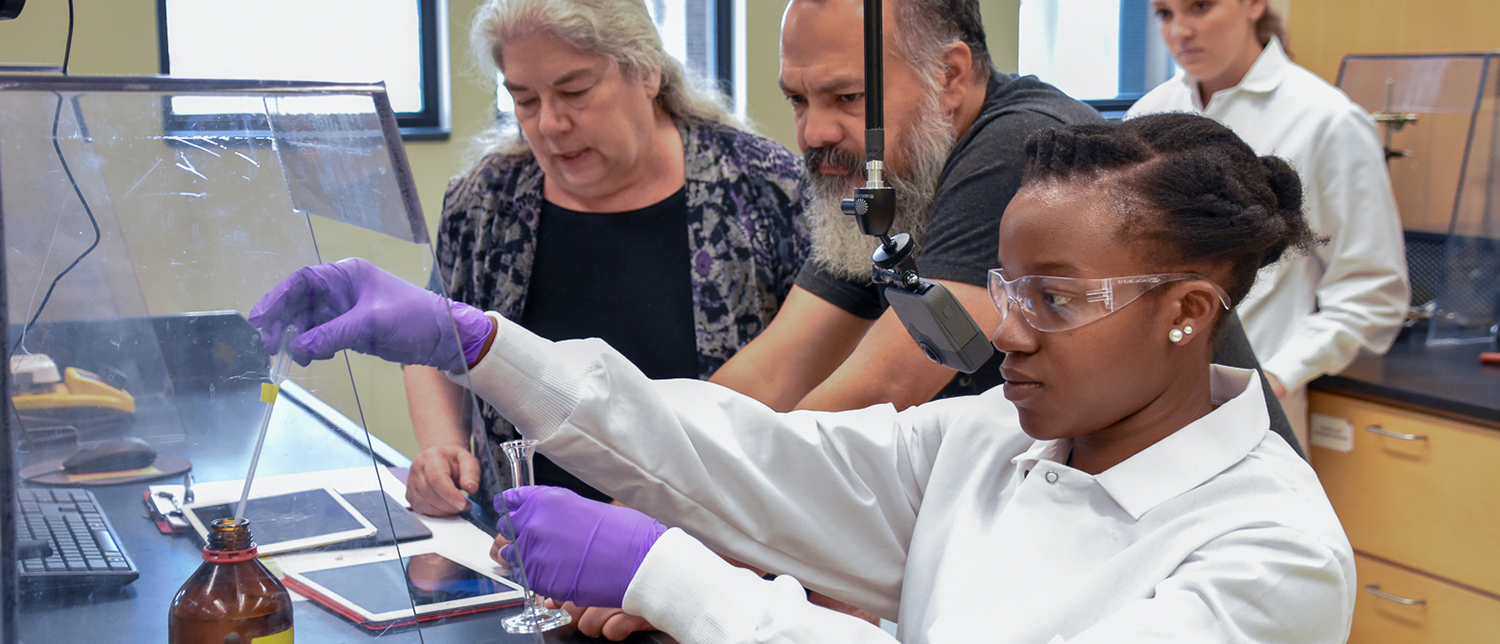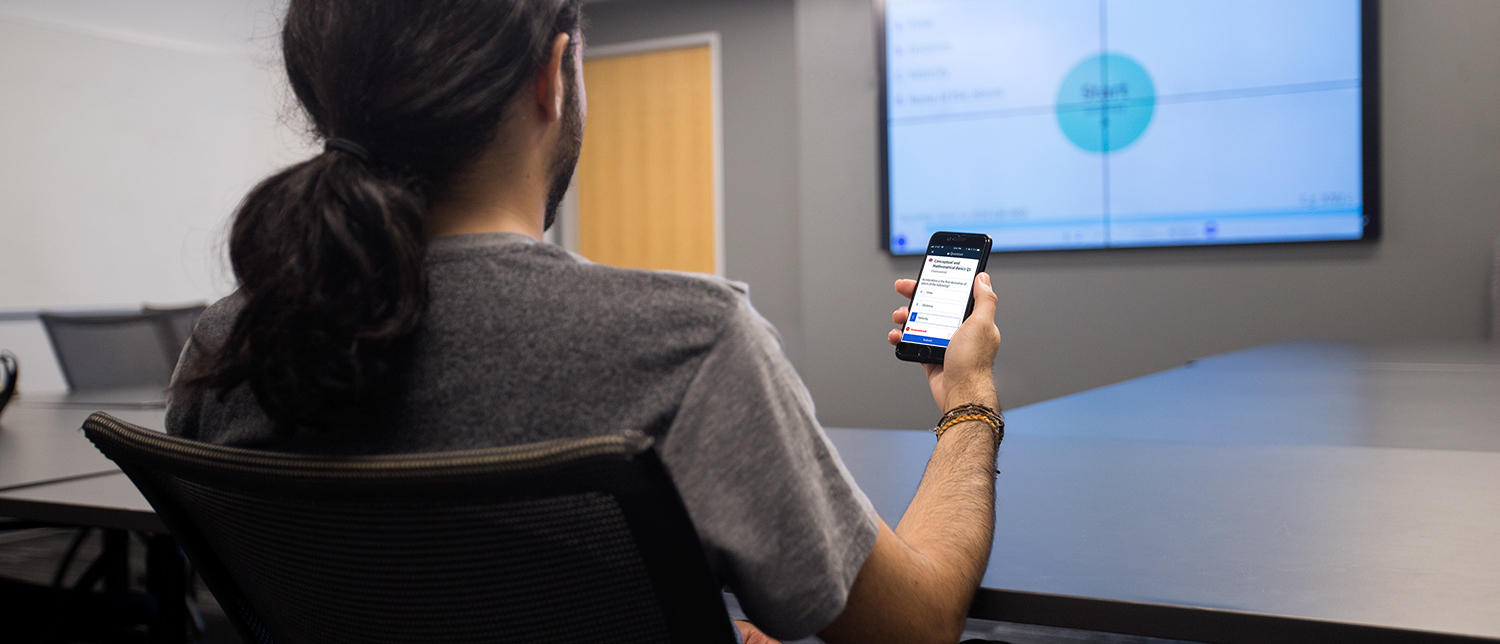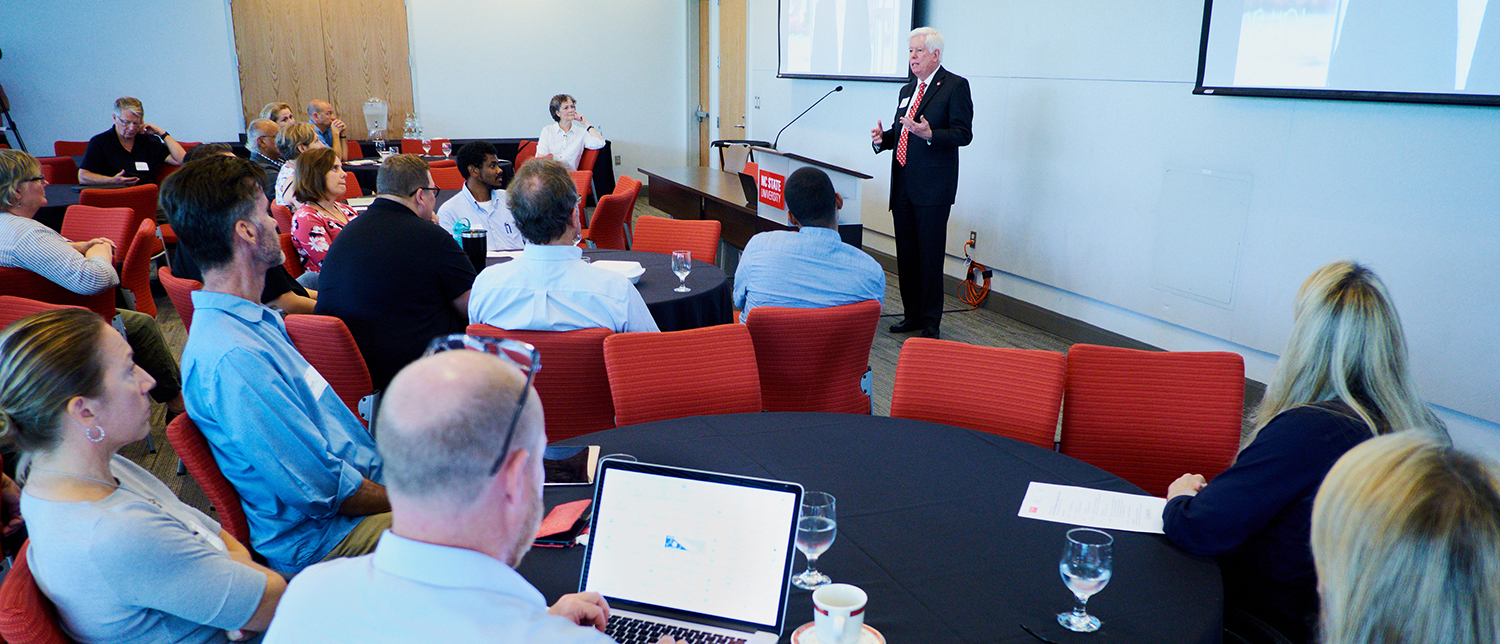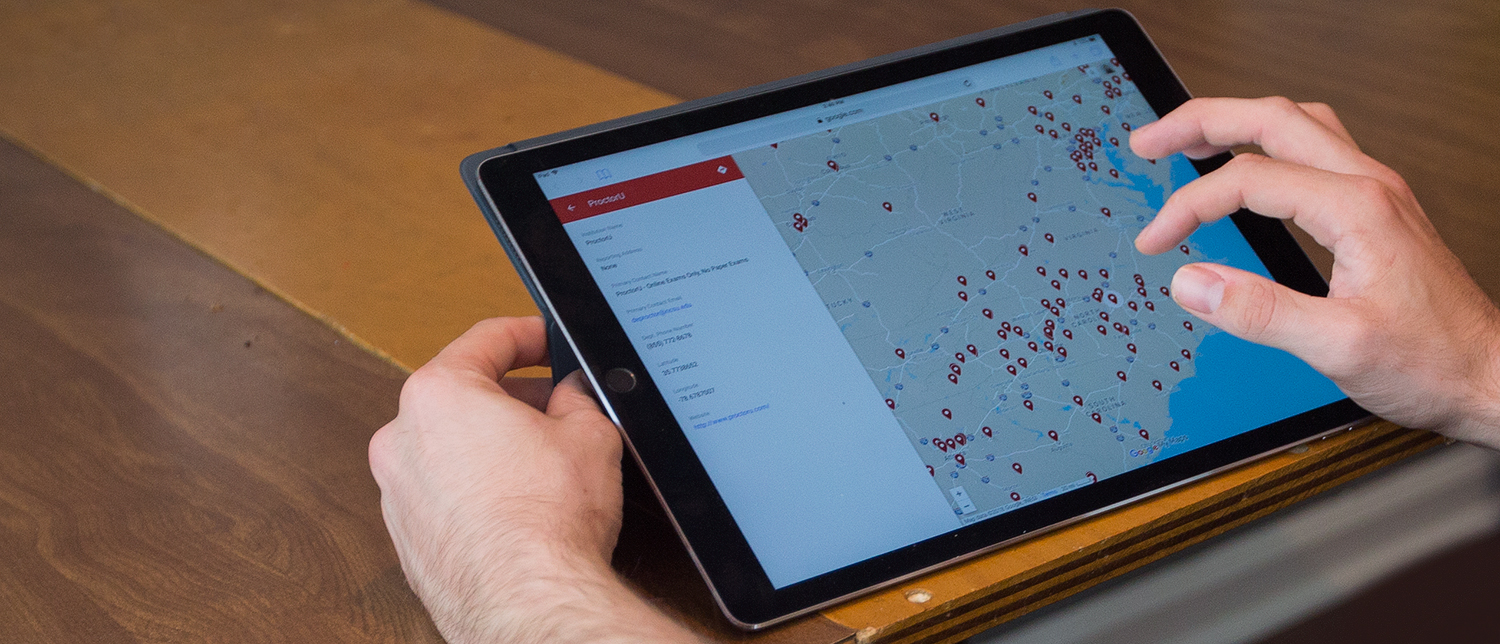For 18 years, DELTA has supported faculty and academic technologies on NC State’s campus and at a distance. Our annual report highlights ways DELTA staff and our partners work together to impact student success. In 2017-2018, our progress toward meeting our strategic goals prompted the launch of new programs including the Online Course Improvement Program featuring Quality Matters, the WolfWare Internal Training and Development program to offer training and professional development options online, the implementation of Top Hat, and more. Each section features DELTA News stories from throughout the year to highlight our progress in reaching each of our strategic goals.

Through an exploratory grant with Maria Gallardo-Williams, DELTA digs into immersive learning through the creation of a series of first-person point-of-view virtual reality lab experiences for organic chemistry. Pictured left to right: DELTA team members Cathi Dunnagan and Arthur Earnest direct student lab assistants in the production of the organic chemistry lab experiences.
DELTA Goal 1: Leverage learning technologies to improve student success.
[University Goals 1 and 2]
- Initiated the Online Course Improvement Program (OCIP) pilot which included six NC State faculty who worked to have their online courses certified by the nationally recognized Quality Matters organization.
- Supported Faculty Fellows in leading 10 workshops with 182 unique enrollments. The Faculty Fellows shared their expertise by presenting at conferences, writing articles and serving as faculty mentors for the Online Course Improvement Program.
- Facilitated 102 teaching with technology and best practices workshops with 689 attendees.
- Provided more than 200 instructional consultations to help instructors in a one-on-one setting.
- Launched the DELTA LearnTech YouTube Channel to provide faculty with short how-to videos from the Instructional Support Services team.
- Partnered with NC State’s Graduate School to offer workshops specifically for graduate students.
- Facilitated the annual Summer Shorts in Instructional Technologies weeklong program, which disseminated best practices to 55 NC State faculty through 20 conference sessions.
- Organized the first DELTA-Con at Summer Shorts — the unconference reached 31 higher education professionals from across the state.
- Provided 15 custom workshops to groups around campus including Poole College of Management and the College of Sciences to deliver customized instruction to faculty on topics such as Moodle, Top Hat and how to record online lectures.
- Completed five course redesigns impacting 565 students.
- Provided innovative instructional support to 35 course production projects.
- Offered a new Rapid Design DELTA Grant for the 2018-2019 cycle to help faculty quickly produce quality online courses.
- Continued to refine the Learning Analytics Processor (LAP) to finalize the automation of the running LAP model and a dashboard to allow faculty to see LMS activity in an interactive and visual way.
- Collaborated with campus partners to define the next iteration of the online syllabus tool.
- Resolved 5,733 support tickets — 4,498 by LearnTech help desk and 1,235 by Mediasite help desk.
- Assisted faculty with the transition from WolfWare Classic.
- Administered 84,751 exams with a total of 20,394 students served locally and remotely.

DELTA implemented the enterprise-level classroom response system Top Hat at no cost to students or faculty. Students can answer interactive questions, discussions and polls using devices such as smartphones, laptops, tablets and even ordinary cell phones.
DELTA Goal 2: Lead the research, implementation and support of innovative, scalable and reliable learning technologies and methodologies.
[University Goals 1 and 3]
- Implemented the enterprise-level classroom response system Top Hat at no charge to students or faculty, which increased the number of users on campus. Faculty accounts increased by 200 percent and student accounts increased by 234 percent.
- Integrated Top Hat with Moodle to synchronize student enrollments and allow grades to easily be transferred from Top Hat to Moodle.
- Contributed 17 idea/code snippets to the Moodle community including six ideas that helped solve an issue within the community.
- Developed an HTML5 Package (H5P) for Moodle User Guide that was adopted by H5P.
- Released the WolfWare WordPress tool and the WolfWare Email List tool after suggestions from faculty and staff for improvements during the technology preview in 2016-2017.
- Retired WolfWare Classic and transitioned hundreds of users to other WolfWare tools. WolfWare Classic was a course management system created in-house in 1999.
- Supported 92.3 percent of students in using at least one learning management system (LMS) tool.
- Supported 1.8 million Mediasite views from 51,272 unique users. In 2017-2018, Mediasite supported 356 courses and an 18 percent increase in instructors from 2016-2017.
- Supported nine DELTA classrooms that served a total of 5,193 students — 4,125 on-campus and 1,068 distance education students.
- Facilitated 1,662 hours of synchronous learning and 93 hours of videoconferencing outside of the classroom.
- Produced 91 instructional videos across 32 academic departments.
- Supported seven courses in exploring mobile applications and virtual reality technology.
- Continued exploration and development of emerging technologies including virtual reality, Matterport virtual tours, LMS gamification and a WebVR distribution option that included closed-captioning functionality.
- Partnered with the Training and Development program to explore competency-based education models to align the program with professional standards.
- Initiated the beginning phases of a WolfWare usability and redesign project to improve the WolfWare interface.
- Researched synchronous learning management system (SLMS) options for an enterprise-level, web-conferencing software.
6,044 students
enrolled in WolfWare Outreach
DELTA Goal 3: Leverage learning technologies to support Outreach and Engagement activities.
[University Goals 4 and 5]
- Launched a new WolfWare Internal Training and Development program to assist NC State faculty and staff with offering internal, non-credit, no-fee professional development and training opportunities and activities.
- Collaborated with six campus departments to provide group training and one-on-one training sessions through WolfWare Internal Training and Development.
- Increased WolfWare Outreach student enrollments by 20.37 percent to 6,044.
- Hosted 234 outreach courses from 113 instructors in 27 programs from across the university.
- Created a guest-user system for non-Unity customers.
- Completed a redesign of the WolfWare Outreach FAQ page to streamline information for instructors.
- Integrated Moodle with REPORTER to seamlessly share data including Moodle student registration, course enrollment and course completion status.
- Initiated a plan for a lower hosting charge in 2018-2019 from $9.37 to $7.93 per student.
- Consulted with 20 new faculty interested in WolfWare Outreach services.

Senior Vice Provost for Academic Outreach and Entrepreneurship Tom Miller gave the keynote address at the first annual Doctor of Design Symposium on Tuesday, Aug. 21, 2018. Miller spoke about innovation in research, design and education. DELTA provided design and development support for the new online degree program.
DELTA Goal 4: Support the creation and delivery of programs and courses that meet strategic enrollment planning and workforce needs for North Carolina and beyond.
[University Goals 1 and 5]
- Provided design and development support for NC State’s new online Doctor of Design program, the only professional doctoral program in the country that offers blended learning in design research to meet the needs of practicing designers.
- Offered 105 degrees, certificates and teacher licensure programs in a variety of disciplines, with 20,190 students enrolled in 1,977 courses and sections taught by 820 NC State faculty.
- Recommended four new graduate certificates for approval.
- Received re-accreditation by the National Council for State Authorization Reciprocity Agreements (NC-SARA) to easily offer online and distance education courses to out-of-state students.
- Conducted and implemented 24 environmental scans and feasibility studies and competitive and trend analysis research projects.
- Participated in student recruitment at six military education fairs.
- Developed, launched and implemented strategic marketing and student recruitment campaigns for 23 online and distance education programs in addition to four new programs.
- Continued social media engagement to increase awareness and student recruitment which resulted in significant increases in followers.
- Implemented a new market research platform Burning Glass Program Insight to identify new student markets, partnership and program/specializations. Partnered with the Graduate School, Enrollment Management and Services and the Office of Institutional Research and Planning to use and implement Burning Glass.
- Implemented the EAB Adult Learner Recruitment Pilot with multiple campus partners. The work in 2017-2018 focused on data collection, research, and segment-specific multi-channel marketing strategies development.
- Partnered with the Graduate School to implement Slate, a customer relationship management system, to simplify the student admission process.
- Conducted assessment surveys that said 62 percent of NC State distance education students strongly agreed/agreed that by the time they graduate, the technology they used in their courses will have adequately prepared them for the workplace.
- Hired DELTA’s first postdoctoral research scholar to study DELTA Grant project evaluation and other DELTA assessment needs.
- Supported an increase of flexible access enrollment by 4.7 percent.

DELTA Testing Services updated the Locate a Proctor map to include 662 pre-approved remote proctor locations. Each location includes contact information and other resources to help students find proctors in their area.
DELTA Goal 5: Promote collaboration, transparency and efficiency in DELTA operations, programs and services.
[University Goal 4]
- Supported Senior Vice Provost for Academic Outreach and Entrepreneurship Tom Miller in completing his five-year review presentation.
- Created a variety of documentation resources for DELTA websites and other services.
- Launched a monthly DELTA Connections newsletter to increase awareness of DELTA services and cross-promote faculty services including workshops, academic teaching tools, LearnTech help desk and more.
- Began the transition of DELTA’s Knowledge Base to ServiceNow, which allows for a more in-depth repository of resources through a university-run source.
- Launched a wellness program to improve employee health with coordinated activities such as lunch and learns, yoga and disc golf.
- Launched an NC State DELTA Facebook channel to reach our faculty audiences in a new way.
- Provided project coordination support for more than 100 projects including collaboration with every team and unit in DELTA.
- Provided professional development opportunities for all DELTA staff through the Project Coordination team’s workshop series on collaboration, communication and more ideas from the Agile conference.
- Increased usage of TeamworkPM across DELTA to manage projects with 157 active projects.
- Updated the Locate a Proctor map to include 662 pre-approved remote proctor locations to help students find proctors in their area.
- Continued to investigate a North Campus location for an expanded proctoring center due to a continual increase in exams proctored.